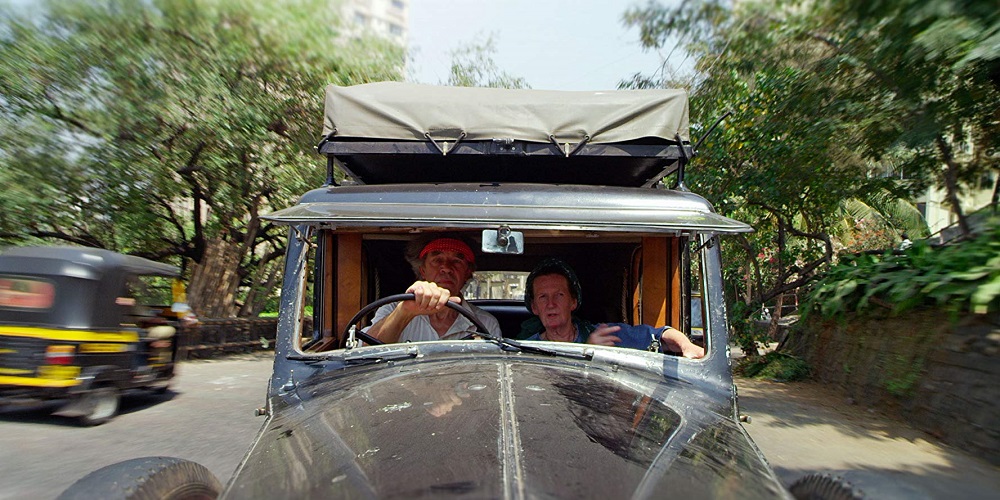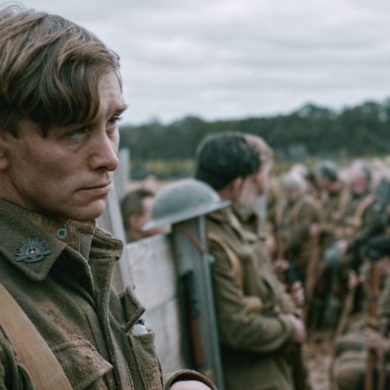Respect the white man, you suck up to him
Ankur Vikal
So goes a line from actor Ankur Vikal midway through Romantic Road, one that carries as much weight and importance as any other uttered in the film.
This is a documentary that celebrates the breadth of India, as well as the decades of love and companionship shared between couple Rupert and Jan Grey, with director Oliver McGarvey taking viewers on a journey through time, with the Grey’s driving their inherited 1936 Rolls Royce across India, experiencing the history, culture, and impact of colonial England on this varied continent.
When the Grey’s were young, they started out their relationship by trekking across India, embracing the history of the land and learning from the people they met. Which is where the nostalgia drenched title, Romantic Road, comes from – a couple recalling their youth, celebrating their dedication to one another, and engaging in something they live for: exploring history and the value of culture.
At once, this is a documentary simmering with talking head figures from hometown London, where Rupert works as a copyright lawyer, all praising the vibrant and diverse lives that the Grey’s lived. One person comments about how whenever they saw the Grey’s walking along the street, they’d simply have to stick their heads out the window to see what Rupert and Jan were wearing at the time, with their wardrobe being updated with outfits from their global excursions. The Grey’s brim with a respect and curiosity for culture all around the world, and this interest is a tangible aspect of what makes Romantic Road a treat to watch.
When the Grey’s travel to India, they continue to have people talk about their presence, with locals talking about their vintage car on social media, making their arrival at the next town an anticipated event. Where Romantic Road could easily have followed the Grey’s trip with rose-tinted glasses, it takes the time to question their presence, and explore the way that white colonisers are still held up high in India. As Vikal says, respect the white man, you suck up to him.
A Rolls Royce is an ultimate symbol of wealth, and as we see many times over, the black beacon of success slices through the Indian traffic effortlessly. The car breaks down a few times, and we hear from mechanics who say that it wouldn’t be able to drive more than a few hundred kilometers. Yet, it soldiers on, it pushes through pothole riddled roads.
Look, Romantic Road is light on allegories, but there’s something about how this well crafted car manages to weather every kind of beating and battering it gets. Whenever it looks like it’s done for, something miraculously happens to it. At one point, the car looks positively doomed, only to have a magic box be discovered under the hood that contains a magic reset button that starts it all over again. For a crude analogy, the Rolls Royce is the perfect symbol of white culture and colonialism. It sails through poverty, ignoring the homeless and the needy, occasionally getting bumped off course, and then coming back to easy road again.
Early in the film, one of the many Indian voices comments about how disparate the divide between wealthy India is against impoverished India. They highlight how absurd it is that many would applaud the Grey’s, all the while ignoring those in need in their own country. It’s a question that isn’t asked enough: why is the white man still so highly celebrated in India?
When director Bhaskar Jyoti Mahanta sees Rupert Grey on TV, he recognises an opportunity that he simply can’t pass up. He asks Grey to act in his film as a white coloniser, fighting against Indian forces. Rupert is initially reluctant, he doesn’t particularly have time in his schedule, and he is not keen on having his image aligned with a toxic past. But, agree to it he does, and we get to witness a slice of a scene which shows that Rupert might be a tolerable actor. It seems all too easy for him to slip into the role, showing how deep running the lineage of colonialism is. It’s almost as if English culture is predominantly a colonial culture, cribbing and conquering cultures around the world.
To be clear, there’s a trepidatious line that the documentary straddles, where it could easily fall on the side of lionising and celebrating the white explorers of the world, actively ignoring the colonial aspects of British culture and history. But, the Grey’s are cognisant of their place in India, and the relationship that they have with Indian culture. They are, for want of a better term, woke. They recognise their privilege, and the ties that British colonialism has with the history of India. Jan quips about how easily and quickly Rupert maneuvered himself into the way Indian traffic works, as if he’s immediately become attuned with Indian culture simply because he understands how their driving language works.
Which is what makes Romantic Road such a curious affair. It presents the celebration of ‘adventure’ as being, well, adventurous. Given the lineage of ‘adventure’ stories in history, they’re often told by white heroes, traipsing through some foreign land, learning and benefitting from a culture which he can dress up as when he returns home, much to the delight of neighbours and colleagues.
I thoroughly enjoyed my time with the film, and found both the Grey’s and the people they meet on their journey fascinating, but I am left scratching my head as to when we are going to start filtering these kinds of white hero stories out of popular culture and films. Don’t get me wrong, Romantic Road is frequently a delight, and is so because of the way it interrogates the Grey’s and their heritage, but we’ve seen this kind of film time and time again. The visuals are sumptuous and grand, everything we expect from a country as ecologically varied as India is, making this story go down the hatch a little easier. Additionally, it wraps up celebrating the Grey’s journey, with a cast of white talking heads all mentioning how courageous their drive across India was.


And just like colonialism and imperialism, the need to drive, to traverse a country, witness its world, is intrinsically entwined with British culture. The need to explore, to watch the world, to learn and be part of society is a rose-tinted one, and as presented in Romantic Road, it’s a purely ego-free one. It is the desire to be enriched by society, enriched by a world, yet, that eagerness is one that’s entwined with the notion of colonialism, we travel, we see, we conquer, it’s ours. That relationship between white culture and Indian culture is at the forefront of Rupert and Jan’s lives.
As Romantic Road wraps up, there’s an odd conclusion to this tender tale, one where Jan and Rupert build a bonfire in their backyard, standing by as they watch it burn. In an act of cognitive dissonance, we’re supposed to see this act as a rebirth, a renewal of their love and care for each other, but as Rupert states midway through the documentary as they travel through a insurgent lead area of India:
Tribal conflict and anti-government insurgents is rife in Naga land, it is remote from what they call mainland India, and until a few months ago, visitors were not allowed. Insurgents show their presence in the area by lighting bushfires in the forests surrounding the villages.
Rupert Grey, narration in Romantic Road
Is this final act of bonfire burning an act equivalent to those of the anti-government insurgents, acting as a sign that the Grey’s are anti-government? No, Romantic Road never suggests as such, but it’s worthwhile mentioning this as a recognition that, as shown in this documentary, the Grey’s are ideal upper-class Brits. They respect cultures from around the world, and champion multiculturalism, both of which seem to be under attack from a modern ‘United’ Kingdom.
I’m reading too much into this film, one that both wants to be surface level and a deep dive, and smarter minds than mine would be able to critically assess the value of Romantic Road more than I could. But, again, we’re drenched in these kinds of films, which are mostly good value and entertaining, so much so that it feels like we’re repeating the same rhetoric over and over again.
So, yeah, enjoy Romantic Road, it’s a very solid film, but keep in the back of your head while you’re watching it the effect that British imperialism had on Indian culture, and the way that has changed and transformed India today. As shown, white people are king, they bring money and wealth and success, so, as Ankur Vikal says:
Respect the white man, you suck up to him.
Director: Oliver McGarvey




